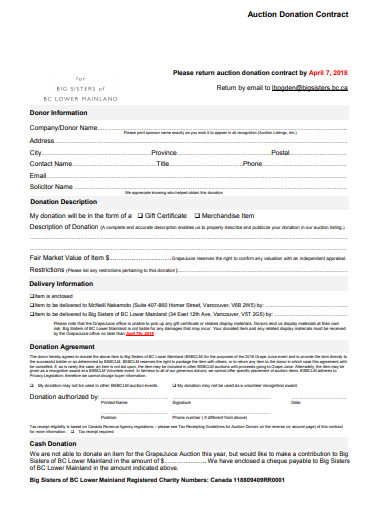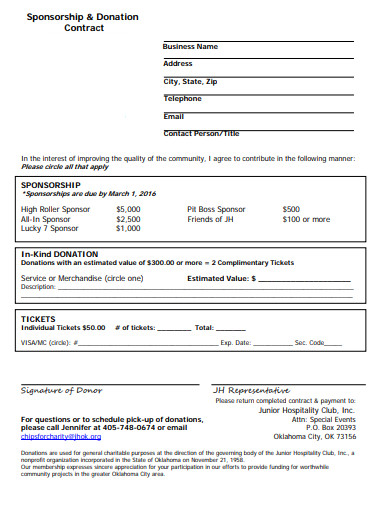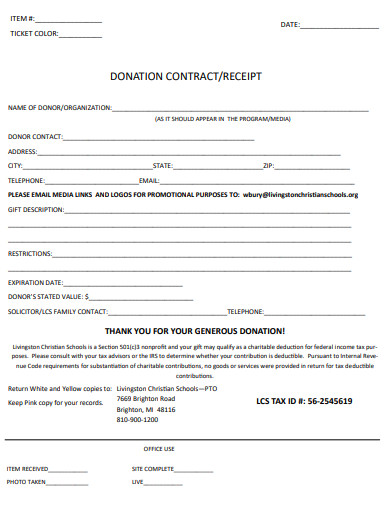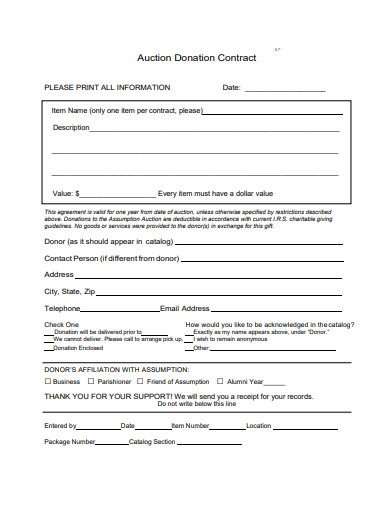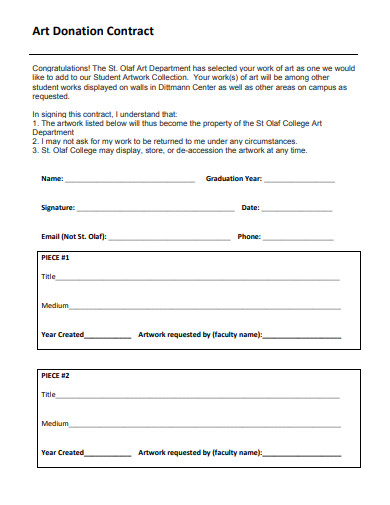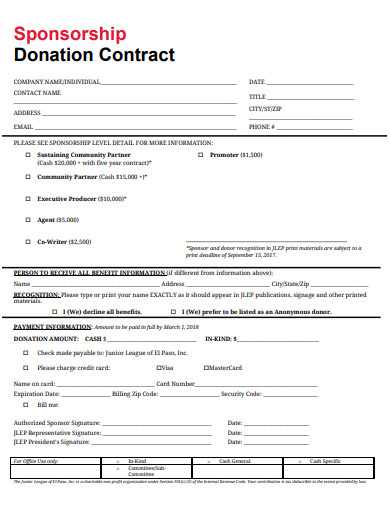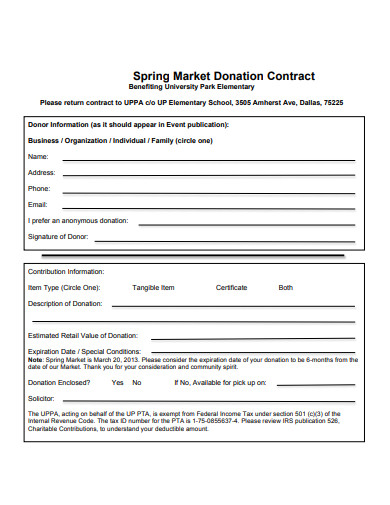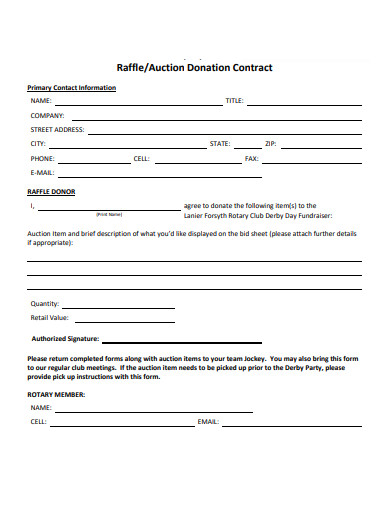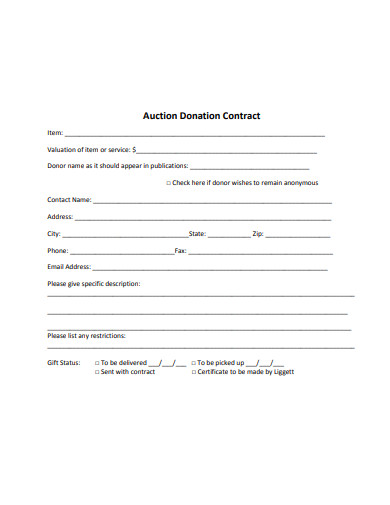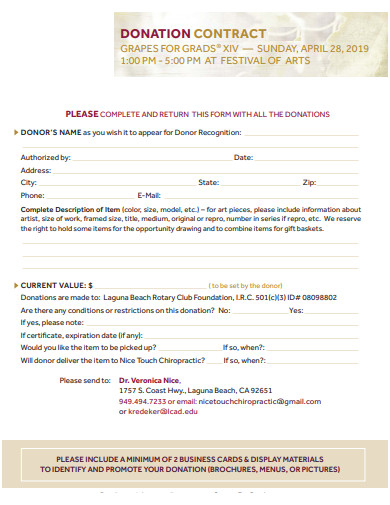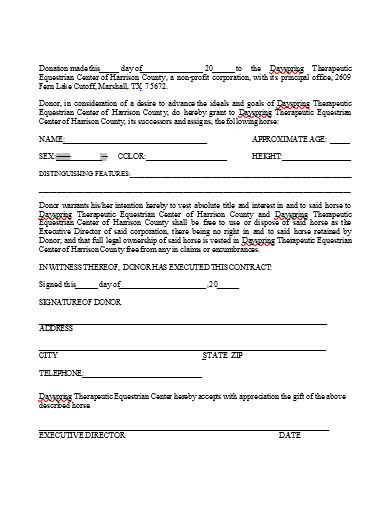10+ Donation Contract Examples to Download
It goes without saying, people who want to donate often find donating a lot of unused things somewhat tricky. Especially when they have no idea as to where their donations would go. Since once you have given it away, the organization has the right to use it in any way they want. But there are some organizations that give out donation contracts to people willing to donate not just unused items, but even monetary donations. Here are some examples of donation contracts below.
10+ Donation Contract Examples
1. Auction Donation Contract
2. Sponsorship and Donation Contract
3. Donation Contract Receipt
4. Sample Auction Donation Contract
5. Art Donation Contract
6. Sponsorship Donation Contract
7. Market Donation Contract
8. Raffle Auction Donation Contract
9. Auction Donation Contract Example
10. Basic Donation Contract
11. Formal Donation Contract
Definition of Donation
Donation means money or unused items that are given to an individual or organization. It also means the act of giving something you no longer need to benefit someone else. An item with value like money or goods that a person gives out to help someone or an organization. An act in which an owner of something valuable, voluntarily gives the title of possession to someone else. Usually without asking for anything in return. A present, to give out to a person who needs it more than you.
Definition of Contract
A contract is a legal agreement between two or more parties creating a mutual obligation. A legally binding deal that falls between two parties. A contract means something legally binding agreement that two parties agree on. This usually involves a certain amount of consideration before signing it. A business arrangement for services at a fixed price.
Definition of Donation Contract
A donation contract refers to the type of agreement wherein a donor volunteers on giving items on certain times. The donor also has the right not to donate in certain times for a valid reason. Donation contracts are used to ensure that the promise can be relied upon in times of need.
Importance of Donation Contract
You might ask yourself why is it so important to have a donation contract? When donations are made voluntarily by people for people. The reason for this is because an organization or a person would want assurance. They want to ensure that when they ask for donations among those who signed the contract. The contract merely acts as a promise made by the donor to donate when the need arises. As well as setting up expectations for both parties and to prevent any discourse or misunderstandings from both parties.
Tips for Filling Out a Donation Contract
Check these tips out before filling out any contract. As contracts are legally binding, the best way to avoid misunderstandings is to know what you’re doing. Another way is to check the following tips out.
- Read everything –Before you fill out everything on the contract, read every single detail needed. It may sound like a boorish task, but reading through everything written down in the contract can be helpful. As well as taking the time to think it through of the decision of donating.
- Follow the instructions- Some contracts have strict rules when it comes to filling it out. To avoid any misunderstandings for filling it out, follow the instructions to a tee. If you have any questions, call the person who is in charge of the contract, or send an email. It is better to ask than to assume.
- Fill out the correct information- Just like any other legal document, filling out the correct information is necessary. Do not fill out incorrect information nor put something that is not true for your case. Organizations can spot the difference and this may lead to misunderstanding.
- Put your signature- Once you are done filling everything out, sign it. Signing it not only means you understood what you have filled out. It also means that everything you have written is true.
FAQs
How important is a contract?
Contracts are legally binding documents that people use to do businesses with. This is an agreement between two or more parties who agree on a common term. Contracts are used as agreements for businesses. This is important because this is what is used as common ground between parties.
Is donating a requirement?
Not really. When you see others donating, it is from the goodness of their own hearts. Nobody is forced to donate. It is merely a voluntary activity.
What happens if a donation contract goes wrong?
As it rarely happens, when a donation contract may go wrong, both parties would have to face one another to solve the issue.
Contracts come with different uses. Mainly for doing business with organizations or companies. A donation contract is no different. This is the agreement between the donor and the organization they promise to donate. Donors who are willing to donate often sign contracts based on the organization they represent. If the donor wishes to take back the donation before he or she passes the contract, that may still be okay. But once he or she has signed the contract and passes it, the donor may have to speak to the representative to fix this issue.



